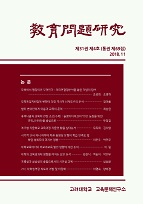대학생의 문화 간 의사소통 역량 증진을 위한 메타버스 기반 학습환경 설계원리 개발
Developing Design Principles for a Metaverse-Based Learning Environment to Enhance University Students’ Intercultural Communication Competence
- 고려대학교 교육문제연구소
- 교육문제연구
- 第96輯
-
2025.0875 - 109 (35 pages)
-
DOI : 10.24299/kier.2025.383.75
- 18

본 연구는 대학생의 문화 간 의사소통 역량(Intercultural Communication Competence, ICC)을 증진할 수 있는 메타버스 기반 학습환경의 설계 원리를 개발하고 그 교육적 타당성을 검토하는 데 목적을 두었다. 이를 위해 설계・개발연구(Design and Development Research: DDR) 절차를 기반으로 요구분석, 설계 원리 도출, 전문가 검토, 형성평가의 과정을 거쳐 학습환경을 구조화하였다. 분석 결과, 사용자 중심성, 포용성, 실재감, 상호작용성을 핵심 축으로 하는 9개의 설계 원리와 33개의 세부 지침이 도출되었다. 또한 전문가 검토를 통한 내용 타당성과 학습자 대상 형성평가를 통해 실행 가능성과 교육적 적합성이 검증되었다. 본 연구는 메타버스를 단순한 기술적 도구가 아닌 교육학적 설계 준거틀로 정립하여, ICC 교육의 이론적 기반과 실천적 가능성을 확장하였다. 나아가 본 연구의 설계 원리는 고등교육을 비롯한 다양한 교육 맥락에서 활용 가능성을 지니며, 후속 연구에서는 정량적 검증 및 장기적 추적을 통해 그 효과성을 심화할 필요가 있음을 제언한다.
This study aimed to develop design principles for a metaverse-based learning environment to enhance university students’ Intercultural Communication Competence (ICC) and to examine its educational validity. Employing Design and Development Research (DDR), the study followed a systematic process consisting of needs analysis, derivation of design principles, expert review, and formative evaluation. As a result, nine design principles and thirty-three detailed guidelines were established, centered on user-centeredness, inclusiveness, presence, and interactivity. The feasibility and appropriateness of the proposed framework were validated through expert content reviews and formative evaluation with students. The findings highlight the potential of the metaverse as an educational framework rather than a mere technological tool, contributing to both the theoretical foundation and practical advancement of ICC education. Furthermore, the proposed design principles can be applied across various educational contexts, particularly in higher education, while future research is needed to validate their effectiveness through quantitative evidence and longitudinal studies.
Ⅰ. 서론
Ⅱ. 이론적 배경
Ⅲ. 연구 방법
Ⅳ. 연구 결과
Ⅴ. 논의 및 결론
참고문헌
(0)
(0)